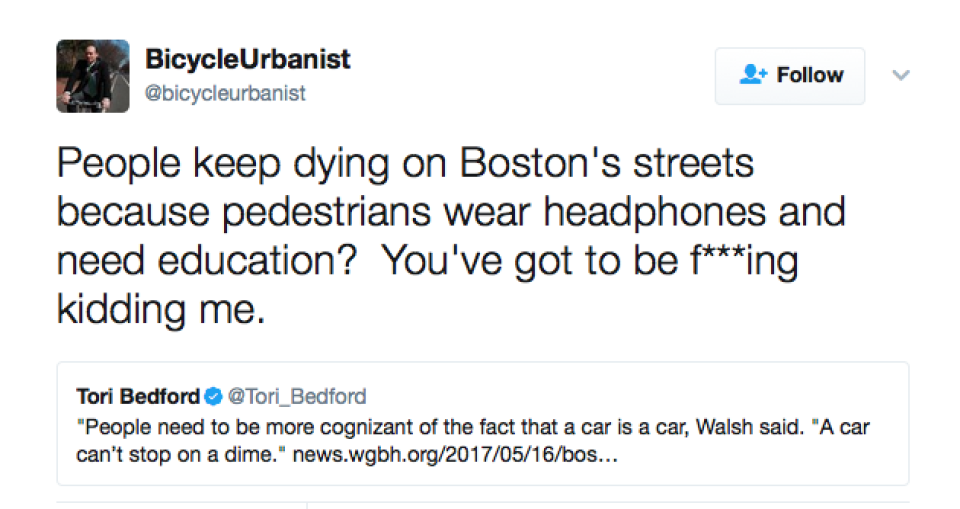Mayor Marty Walsh urged bicyclists and pedestrians to exercise caution and follow the rules of the road, in the wake of the fatal hit-and-run accident that killed cyclist Rick Archer.
“There’s a lot of talk about what the city is doing to make everything safer — pedestrians need to be safer,” Walsh said. “Pedestrians need to put their head up when they’re walking down the street, take your headphones off … you’ve got to understand, cars are going to hit you.”
The death of Rick Archer, a 29-year-old South Boston resident who was hit by a car and then died two days later, has served as a wake-up call to the city. Bicyclists and advocates for street safety have called on the city to implement safer roadways and bring fatalities down to zero on city roads.
According to Walsh, that can only happen if pedestrians and cyclists take more personal responsibility.
“We need to coexist together on the roads of our city … we need to start following the rules,” Walsh said. "People need to be more cognizant of the fact that a car is a car. Even bicyclists, when you’re riding; a car can’t stop on a dime.”
A recent report from the Governors Highway Safety Administration showed an 11 percent spike in the number of pedestrians killed on U.S. roadways last year, including a slight increase in Massachusetts. The report credits the trend to distractions, like using phones while driving or walking.
“I see it all day long, people walking down with headphones on,” Walsh said. “You can’t hear a car coming, and they don’t know you have headphones on, so take them off.”
In a recent City Council meeting, Walsh said residents were placing too much blame on his administration to solve the problem. “A lot of people were pointing the finger at me and at the City for not doing enough — we’re doing everything we can,” Walsh said. “It’s a big city, there’s a lot going on.”
According to Walsh, the city’s goal is to get fatality rates down to zero, everywhere.
In 2016, the city reduced the default speed limit to 25 mph instead of 30 mph. The city has added several bike lanes on Massachusetts Avenue and on Congress and Beacon Streets, and plans to install protected lanes on sections of Commonwealth Avenue.
According to Walsh, the Neighborhood Slow Streets Program , which launched last year, is working to “calm traffic” in 47 high-crash incidence areas around the city.
"Boston’s infrastructure was created without these considerations in mind," Walsh said. “A lot of this got developed over the last 20, 30 years, and there was nothing taken into consideration for bikes and pedestrians,” Walsh said. “We need to be patient.”
Walsh said he would consider launching an educational program for drivers, cyclists and pedestrians to better understand the rules of the road.
“We have to do something,” Walsh said. “Every day it seems like more and more, we have fatalities in the road with our bicyclists, we have pedestrians hit, we have cars crashing. People always look for somebody to put the blame to — I don’t think it’s anyone’s blame. I think it’s society’s, what we’re dealing with. We have to do something about educating drivers and walkers on what their rights are.”
Shortly after Walsh's interview, bicycle safety advocates spoke out against the mayor's statements on Twitter and via email to WGBH.

Jonathan Fertig, the Chairman of StreetsPAC MASS, said the organization was “dismayed by Mayor Walsh's comments.”
“We recently launched because of precisely this type of callousness from the administration,” Fertig wrote in an email to WGBH News. “After 200+ people turned out last week at the Boston Transportation Department funding hearing at the Boston City Council, we hoped that the tenor of the discussion would change. Clearly that didn't happen; rather the Mayor has doubled down on his insistence that his administration is doing all it can to make our streets safe for everyone.”
Fertig called on the Mayor to apologize for his comments and to agree to a meeting with mobility advocates to “explain why his words are so hurtful.”
Andrew McFarland, the Community Engagement Manager of LivableStreets Alliance, said his organization, which partners with the Massachusetts Vision Zero Coalition, were “very shocked and disappointed with the Mayor's comments this afternoon.”
“They're victim-blaming,” McFarland wrote in an email to WGBH News, “and completely fly in the face us his administration's own policy, Vision Zero.”
To hear Mayor Walsh’s full interview with Boston Public Radio, click on the audio player above.





